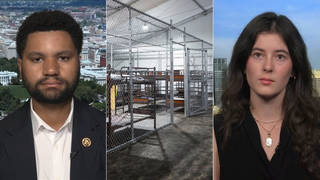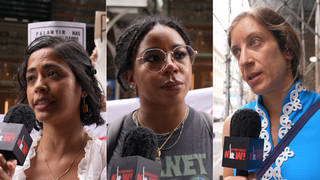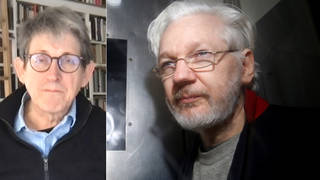
Topics
Guests
- Robert Greenwaldfounder and president of Brave New Films. He is a producer, director and activist. His new film is called War On Whistleblowers: Free Press and the National Security State. Greenwald’s other films include Rethink Afghanistan and Sick for Profit.
We continue our discussion with filmmaker Robert Greenwald about his new documentary, War on Whistleblowers: Free Press and the National Security State_. Click here to watch Part 1 of this interview.on
The film looks at four whistleblowers who had their lives practically destroyed after they went to the press with evidence of government wrongdoing. They are Michael DeKort, Thomas Drake, Franz Gayl and Thomas Tamm.
Whistleblowers have come under unprecedented attack by the Obama administration. Evoking the Espionage Act of 1917, the administration has pressed criminal charges against no fewer than six government employees, more than all previous presidential administrations combined. In the film, Greenwald also interviews government oversight experts and investigative journalists who warn about the chilling effect prosecutions may have on potential whistleblowers and the journalists who help them.
AMY GOODMAN: This is Democracy Now!, democracynow.org, The War and Peace Report. I’m Amy Goodman, with Juan González, looking at a new film directed by Robert Greenwald on whistleblowers. It looks at four whistleblowers who had their lives practically destroyed for saving lives—that is, after they went to the press with evidence of government wrongdoing. They’re Michael DeKort, Thomas Drake, Franz Gayl and Thomas Tamm. In the film, Greenwald also interviews government oversight experts, investigative journalists, who warn about the chilling effect prosecutions may have on potential whistleblowers and the journalists who help them.
The film, War on Whistleblowers, profiles Michael DeKort, a Lockheed Martin project manager who posted a whistleblowing video on YouTube. In it, he objected to subpar emergency systems on board U.S. Coast Guard boats. Before speaking publicly through his YouTube video, DeKort brought these issues to the attention of immediate management and then to higher-up executives, including the CEO of Lockheed Martin and the board of directors. After his pressing concerns were continually ignored for two years, he was discharged from Lockheed Martin. And as a result, DeKort went public. His video gained a wide amount of exposure. It eventually led to a congressional hearing on the entire Deepwater project. As a result, the boats were taken out of service, engineer changes were made, and a settlement was reached regarding the electronic issues.
In this clip, DeKort talks about how he discovered that radios were not waterproof on Coast Guard boats.
MICHAEL DEKORT: One day, somebody came to me, and they said, “I’m going to tell you something just so my conscience is clear.” The radios that they were putting on the smaller boats, that were exposed, were not waterproof. Some of the systems mounted on the outside of the boat wouldn’t survive harsh elements or harsh weather. The radios would have failed if they even got a little bit wet. And you need a radio to communicate, right? The backup for that radio not being on that small boat is a flare. If you could screw something up in that area, you’re pretty much open game for anything else.
AMY GOODMAN: That’s Michael DeKort, the Lockheed Martin project manager who posted this whistleblowing video on YouTube objecting to the subpar emergency systems on board U.S. Coast Guard. Talk about what happened, Robert Greenwald, then.
ROBERT GREENWALD: Well, it’s almost—you know, it’s almost laughable, if it weren’t tragic—making radios that are not waterproof that go on Coast Guard boats. I mean, think about it for a moment. It’s out of Kafka or something. So, it was another example of why whistleblowers are important. And what we found in the film, every single whistleblower came up against the wall. And what did they do? They went to the media. And investigative reporters came through in each and every case—not accepting what they said—digging into it, researching it, getting the word out there, and then often that leading to real change—not enough change, but leading to some change.
JUAN GONZÁLEZ: And the government going after the journalists, as well.
ROBERT GREENWALD: Yes. I mean, we’re seeing that more and more. We’re seeing that tragically with the Obama administration. And as journalists have been saying—we’ve been doing panels and discussions—it’s changed the environment. They can’t get people on the phone that they used to be able to get on the phone, because journalists are threatened themselves, and the sources don’t want to talk as much. I mean, it’s never been easy. You know, every single one of the whistleblowers in the film paid a deep personal price—family, economic, reputation, career. All those things were affected. Now, on top of all that, you have this terrific and horrible powerful legal force coming after them, huge legal bills for everybody.
JUAN GONZÁLEZ: Let’s turn to another clip from the film, War on Whistleblowers: Free Press and the National Security State. Here, several prominent journalists explain that the more powerful the national security state becomes, the more we need whistleblowers. The clip begins with investigative journalist Seymour Hersh, then Washington Post reporter Dana Priest, and ends with Pentagon Papers whistleblower Daniel Ellsberg.
SEYMOUR HERSH: There’s a huge architecture we don’t see in the secret world. And believe me, these guys can operate, and they are operating. And they operate with total impunity. There’s so much we don’t know and so much we can’t know, so much locked up in legal classification.
DANA PRIEST: The more powerful the national security state becomes, the more we need whistleblowers. It is all in the classified realm. What we discovered as a result of our research is that there are over 1,200 government organizations working at the top-secret level on counterterrorism. There are another close to 2,000 companies that work for the government on top-secret matters. And they’re all located in about 10,000 locations throughout the country. There are close to a million people who have top-secret clearance.
DANIEL ELLSBERG: We talk about a national security state that pretends that it’s interested in our national security, but in fact it’s interested in the security of corporate interests, of agency interests, of politicians keeping their jobs.
DANA PRIEST: It is, as one source said, a self-licking ice cream cone. It’s there to support itself.
JUAN GONZÁLEZ: The Obama administration has not only cracked down on whistleblowers, but also the journalists who assist them. Let’s go to this clip. This one begins with Danielle Brian, executive director of the Project on Government Oversight, then goes to Ben Freeman of the—national security investigator at the Project on Government Accountability, then Jane Mayer, a staff writer at The New Yorker, and ends with David Carr, a New York Times journalist.
DANIELLE BRIAN: One of the most disappointing things we’ve seen has been the president’s commitment to going after the journalists that they’ve worked with, when all they’re doing is exposing wrongdoing.
BEN FREEMAN: It’s put a lot of journalists on the defensive to make them even more reluctant to work with whistleblowers.
JANE MAYER: It really criminalizes the news-gathering process.
JAKE TAPPER: There just seems to be disconnect here: You want aggressive journalism abroad; you just don’t want it in the United States.
JAY CARNEY: Well, I—I—I would hesitate to speak to any particular case.
DAVID CARR: The Obama administration had taken what was an understandable sense of governmental discipline and kind of gone over the top with it and began prosecuting every which way.
JUAN GONZÁLEZ: That was David Carr, New York Times journalist, and before that, Jane Mayer, Ben Freeman and Danielle Brian. Robert Greenwald, what about this and the pressures then on the journalists in terms of being able to persist in digging up these stories?
ROBERT GREENWALD: Look, investigative journalists, as you all know, has never been an easy task. And we really should be celebrating the journalists and celebrating the whistleblowers. Instead, we have an administration affected far too significantly by the national security state, affected far too significantly, as Dana and Jane say in the film, from listening to the CIA, and working to keep secrets rather than the promise that we all had of transparency.
AMY GOODMAN: I wanted to go back to Jake Tapper. That was the last clip that we just saw, Jake Tapper at the White House. Last year, the White House correspondent for ABC News questioned the Obama administration for applauding truth seekers abroad while simultaneously prosecuting them at home. Tapper raised his concern shortly after White House Press Secretary Jay Carney lamented the deaths of journalists Anthony Shadid and Marie Colvin, saying they had given their lives in order to bring truth while reporting in Syria. This is Jake Tapper.
JAKE TAPPER: How does that square with the fact that this administration has been so aggressively trying to stop aggressive journalism in the United States by using the Espionage Act to take whistleblowers to court? You’re currently—I think that you’ve invoked it the sixth time, and before the Obama administration, it had only been used three times in history. You’re—this is the sixth time you’re suing a CIA officer for allegedly providing information in 2009 about CIA torture. Certainly that’s something that’s in the public interest of the United States. This administration is taking this person to court. There just seems to be disconnect here: You want aggressive journalism abroad; you just don’t want it in the United States.
JAY CARNEY: Well, I—I—I would hesitate to speak to any particular case, for obvious reasons, and I would refer you to the Department of Justice for more on that.
AMY GOODMAN: That was Jay Carney, the White House press spokesperson, answering Jake Tapper’s question, ABC reporter. Let’s talk about the sacrifices that the film shows, considerable sacrifices whistleblowers made to tell the truth. They suffered job loss, endless litigation, heavy emotional and psychological toll. The film ends with where they are today. The film—some of the people we hadn’t talked about: Thomas Drake, who was a National Security Agency whistleblower, and Thomas Tamm, worked in the Justice Department and blew the whistle—the film—this clip begins with Franz Gayl, who blew the whistle on the Pentagon, then Thomas Drake, Michael DeKort and Thomas Tamm.
FRANZ GAYL: I’m now working back at the Pentagon in the office from which I was removed. Today, I feel great. You know, it could be so much worse. And I feel very lucky, because I’ve received a lot of support from a lot of outsiders that I don’t think every person in my situation gets.
THOMAS DRAKE: Where am I now? You know, I work full-time at an Apple Store in the greater D.C. area. I’ve gone back to school. I’m about a year away from finishing up my Ph.D. in public policy and administration, specializing in leadership and management.
MICHAEL DEKORT: Well, I mean, it went from me living in an amazing place. I was in northern Colorado Springs, and I had a great career. And it was, again, 13 years, and my family liked being there. And then that all came to an end. So, we had to leave. And the first time we left, I actually had no job to go to, so we had to stay—we stayed with family. But I had to go to a completely different industry. So, employment has been—it’s been spotty, you know, here and there. I’m employed now, and I have a good job, and I’m back in Pittsburgh, where my wife’s family is from, so that’s fine.
THOMAS TAMM: After the raid, I just kind of figured that I was too controversial maybe to hire for a lot of different reasons and a lot of different positions, so I just opened an office on my own to do criminal defense litigation. But, you know, the business didn’t come—didn’t come screaming through the door. So, you know, from this point forward, I’d like to try and become actually more active on—and talk out maybe on college campuses or use this movie, really, to tell people what I did and why I did it.
AMY GOODMAN: That last voice, Thomas Tamm, who blew the whistle on government surveillance of Americans. Robert Greenwald, where everyone ends up? I mean, Drake ends up at an Apple Store in the Washington, D.C., area, one of the smartest guys at the NSA, as one of the people in your film said.
ROBERT GREENWALD: Yes. They’ve all paid, you know, a terrible personal price, and they’ve really done it for the purest of reasons. It’s about democracy. It’s about facing something in their work, in their lives, and saying, “I can’t accept this.” And how many of us would stand up? How many of us would give up so much in order for—to fight for principles that they believe in?
JUAN GONZÁLEZ: I’d like to go to this clip from the film where whistleblower Daniel Ellsberg talks about the risks taken by Army Private Bradley Manning. Manning was responsible for the largest leak of state secrets in U.S. history.
DANIEL ELLSBERG: Only the person who reveals the criminal activity who is prosecuted for it. And I would say I identify very strongly with Bradley Manning, because, first of all, he was doing this because he felt crimes were being committed, horrible things. He said, “I am prepared to go to prison for life, or even be executed.” So, once again, it’s the messenger.
JUAN GONZÁLEZ: And the Bradley Manning case, Robert Greenwald?
ROBERT GREENWALD: Yes. Well, that, of course, requires a whole film or films on its own. But Mr. Ellsberg was able to connect it up for us, to explain that this is ongoing, that it hasn’t been resolved yet, as you and of course the listeners all know. But I think it explains the tradition, you know, from Ellsberg to Manning and all these other people in between. And it’s a very, very important tradition. James Risen, who’s been—had terrible legal problems, had said, “Can we have a democracy—
AMY GOODMAN: James Risen at The New York Times.
ROBERT GREENWALD: Yeah, sorry, James Risen of The New York Times, who’s been subjected to tremendous legal problems, has said at the Press Club, “Can we have a democracy without a robust investigative reporting?” And there’s a big real question there.
AMY GOODMAN: And he says, no, he thinks not.
ROBERT GREENWALD: Yes.
AMY GOODMAN: Let’s go to James Risen.
LUCY DALGLISH: There are some risks involved with publishing stories. You can be hauled into court for a very lengthy, expensive court battle, if they are trying to get you to divulge your sources. Jim Risen of The New York Times is very familiar with this particular problem. Jim was subpoenaed in connection with a book he wrote. That case is still pending.
JAMES RISEN: Basic issue is whether or not you can have a democracy without aggressive investigative reporting. And I don’t believe you can.
AMY GOODMAN: That’s James Risen of The New York Times. The government is continuing to go after him for his exposé of government surveillance. Robert Greenwald, we want to thank you very much for being with us, founder and president of Brave New Films. He’s producer, director and activist. His new film is called War on Whistleblowers: Free Press and the National Security State. Among his other films, Rethink Afghanistan, Sick for Profit and so many more. Thanks so much for joining us.
ROBERT GREENWALD: Thank you.
AMY GOODMAN: I’m Amy Goodman, with Juan González.












Media Options